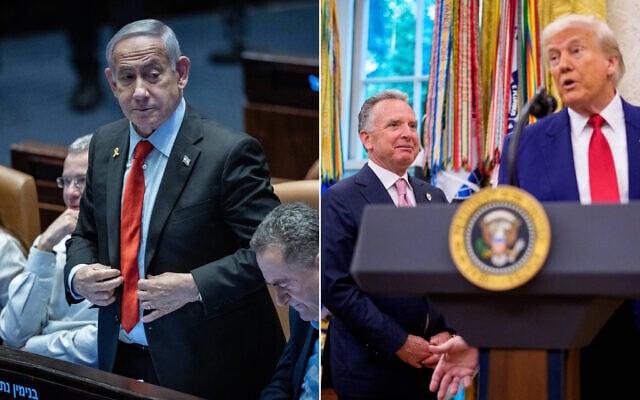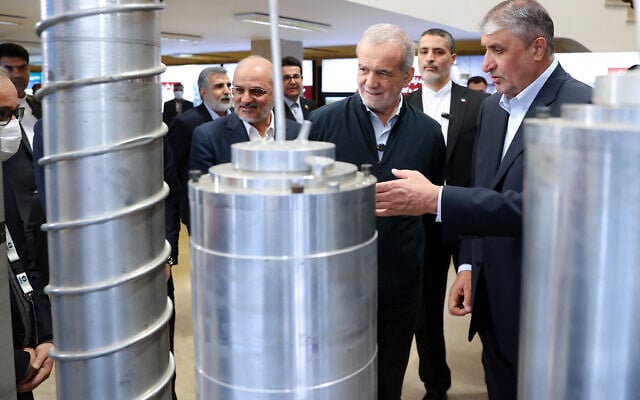
Iran’s Supreme Leader Ayatollah Ali Khamenei meets Saudi Defence Minister Prince Khalid bin Salman in Tehran, Iran, April 17, 2025. Office of the Iranian Supreme Leader/WANA (West Asia News Agency)/Handout via REUTERS/File Photo Purchase Licensing Rights
| Published May 31, 2025
Saudi prince told Tehran the region can’t bear more escalation; response was that Iran wants nuke deal but won’t end enrichment; WSJ says US prepping ‘term sheet’ that includes enrichment ban
Saudi Arabia’s Clandestine Warning to Iran: Reach a Deal with the U.S. or Risk Israeli Strike
In a rare and bold diplomatic move, Saudi Arabia has reportedly issued a stark warning to Iran: engage with the United States on a nuclear agreement or face the threat of military action by Israel. The warning, delivered in April 2025 by Saudi Defense Minister Prince Khalid bin Salman during a confidential visit to Tehran, reflects a new level of urgency in the region’s handling of Iran’s nuclear ambitions.
A Message from Riyadh to Tehran
According to multiple reports, Prince Khalid traveled to Tehran as an emissary of King Salman bin Abdulaziz, carrying a direct message to Iran’s Supreme Leader Ayatollah Ali Khamenei. The message reportedly urged Iran to consider U.S. President Donald Trump’s offer to return to the negotiating table and reach a new nuclear agreement. The alternative, Saudi officials warned, could be a devastating Israeli strike on Iranian nuclear sites.
The meeting marked a rare high-level interaction between the two regional powers, who have been historical adversaries but have pursued cautious rapprochement in recent years. The visit also took place amid increasing international pressure to prevent a nuclear arms race in the Middle East.
Background: Renewed U.S. Pressure on Iran
President Trump, during his second term, has renewed efforts to constrain Iran’s nuclear program through a combination of sanctions and the threat of military force. His administration has extended an offer for fresh negotiations under stricter terms, including tighter limits on uranium enrichment and regional missile activity.
Iran, reeling under economic sanctions, has expressed conditional interest in re-entering talks but remains skeptical of Washington’s intentions. Iranian President Masoud Pezeshkian has reportedly been more open to dialogue than the clerical establishment, leading to internal tensions within Iran’s leadership.
A handout picture provided by the Iranian presidency shows Iran’s President Masoud Pezeshkian (2nd R) and the Atomic Energy Organisation of Iran (AEOI) chief Mohammad Eslami (R) during the ‘National Day of Nuclear Technology,’ in Tehran, on April 9, 2025 (Iranian Presidency / AFP)
Denials and Discreet Channels
Iran has officially denied reports of a Saudi warning, with a foreign ministry spokesperson calling the story “categorically false.” Nevertheless, anonymous sources in the Gulf and intelligence communities maintain that the message was indeed delivered and that it represented a coordinated effort among Gulf Arab states to de-escalate tensions.
Reports also suggest that Saudi Arabia’s message was relayed not in isolation, but in the context of wider regional consultations. Leaders in Qatar, the United Arab Emirates, and other Gulf states have reportedly urged Iran to engage diplomatically with the U.S., emphasizing their opposition to a new regional war.
Israel’s Growing Frustration
Meanwhile, Israel continues to view Iran’s nuclear capabilities as an existential threat. Israeli leaders, including Prime Minister Benny Gantz, have hinted that time is running out for diplomacy. Israeli intelligence has reportedly updated contingency plans for strikes on Iranian nuclear facilities if progress on diplomacy stalls.
Saudi Arabia’s warning to Iran may reflect Riyadh’s concerns that Israel could act unilaterally and drag the region into open conflict. By urging Iran to make a deal with the U.S., the Saudis appear to be trying to head off such a scenario.

L: Prime Minister Benjamin Netanyahu in the Knesset in Jerusalem, on May 28, 2025. (Yonatan Sindel/Flash90); R: US envoy Steve Witkoff and US President Donald Trump at the White House in Washington, on May 28, 2025.
The implications of Saudi Arabia warning Iran to accept a U.S. nuclear deal—or face potential Israeli military action—are wide-reaching and signal a dramatic recalibration in regional diplomacy and strategic posturing. Here are the key takeaways:
1. Regional Realignment and De-escalation Efforts
Saudi Arabia’s outreach to Iran shows Riyadh’s intent to avoid regional conflict, especially one sparked by Israeli airstrikes. This highlights a maturing foreign policy—focused on diplomacy over proxy conflicts—as Saudi Arabia continues its Vision 2030 economic and modernization goals. It also reflects warming ties between regional rivals following the 2023 China-brokered Saudi-Iran détente.
2. Israel’s Strategic Leverage
Israel’s threat of unilateral action underscores how seriously it views Iran’s nuclear ambitions. It also indicates that despite normalization talks with Saudi Arabia stalling, Israel still holds sway over regional security calculations—pressuring both the U.S. and Gulf nations to act before it does.
3. U.S. Influence and Trump’s Calculus
Trump’s return to power and push for a new nuclear deal introduces a volatile but forceful diplomatic front. The Saudi warning implicitly supports U.S. leverage by telling Iran: “This is your best chance—take it, or face real consequences.” It’s a rare instance of U.S., Israeli, and Saudi interests aligning to pressure Iran.
4. Iran’s Internal Dilemma
Iran’s leadership now faces a balancing act. Accepting Trump’s deal may relieve economic pressure but undermine hardliner credibility. Refusing could risk escalation with Israel and further alienate potential regional partners like Saudi Arabia.
5. Risk of Military Escalation
If diplomacy fails, the situation could quickly spiral. An Israeli strike—even with tacit Saudi backing—could provoke Iranian retaliation across the region, including missile strikes on Gulf allies or U.S. bases. This could derail oil markets, global shipping, and broader economic stability.
Overall Takeaway:
Saudi Arabia’s unprecedented warning to Iran—accept a nuclear deal with the U.S. or risk an Israeli strike—marks a major shift in Middle East diplomacy. It signals a new phase where Gulf powers are actively working to prevent regional war, even if it means aligning more closely, at least tactically, with former rivals like Israel and assertive players like Donald Trump. The message is clear: war is bad for business, and diplomacy—however flawed—is now the region’s preferred tool for survival.
SOURCES: THE TIMES OF ISRAEL – Saudis warned Iran to reach agreement with US or risk war with Israel – Gulf sources
REUTERS – Saudi warned Iran to reach nuclear deal with Trump or risk Israeli strike
DAWN – Saudis warned Iran to reach nuclear deal or risk Israeli strike
I24 NEWS – Accept deal with Trump or face Israeli attack, Saudi minister warned Iran






Be the first to comment